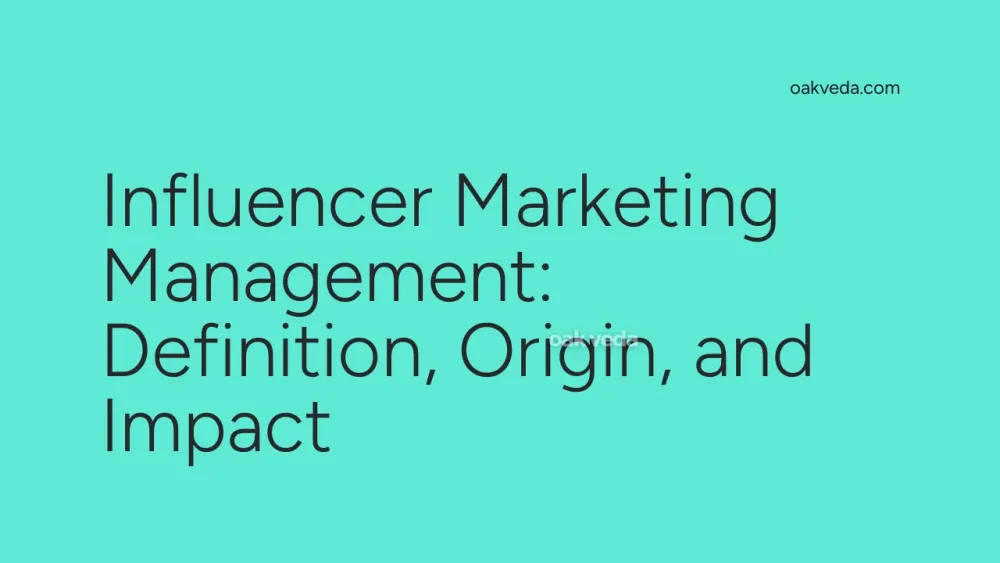
What is Influencer Marketing Management?
Influencer marketing management is a strategic process that involves identifying, recruiting, and managing influencers to promote a brand or product. This approach leverages the power of social media personalities, content creators, bloggers, and celebrities to drive brand awareness, engage target audiences, and boost sales. Unlike traditional marketing methods, influencer marketing management focuses on building authentic relationships and creating mutually beneficial partnerships between brands and influential individuals.
Origin and Development of Influencer Marketing Management
The concept of influencer marketing has roots in celebrity endorsements, but it has evolved significantly with the rise of social media platforms. As digital platforms gained popularity in the early 2000s, everyday users began amassing large followings, giving birth to the modern influencer. The need for systematic management of these relationships led to the development of influencer marketing management as a distinct discipline within digital marketing.
How Influencer Marketing Management Works
Influencer marketing management operates through a series of interconnected steps:
- Strategy Development: Brands define their goals, target audience, and campaign objectives.
- Influencer Identification: Researching and selecting influencers whose audience aligns with the brand's target demographic.
- Outreach and Negotiation: Contacting potential influencers and establishing partnership terms.
- Campaign Execution: Collaborating with influencers to create and distribute content.
- Performance Measurement: Analyzing campaign results and optimizing future strategies.
Types of Influencer Marketing Management
Influencer marketing management can be categorized based on the scale and approach:
- In-house Management: Brands handle all aspects of influencer relationships internally.
- Agency-led Management: Marketing agencies specialize in managing influencer campaigns for multiple clients.
- Platform-based Management: Utilizing software tools to streamline the influencer marketing process.
Popular Examples of Influencer Marketing Management
Successful influencer marketing campaigns often result from effective management. For instance:
- Daniel Wellington's watch brand built its empire through strategic partnerships with micro-influencers on Instagram.
- Gymshark's collaborations with fitness influencers catapulted the brand to global recognition.
- Glossier's use of everyday customers as influencers created a strong community-driven marketing approach.
Impact of Influencer Marketing Management on Social Media Culture
Influencer marketing management has significantly impacted social media culture by:
- Blurring the lines between organic content and advertising
- Creating new career opportunities for content creators
- Shifting consumer trust from traditional celebrities to relatable online personalities
- Encouraging brands to focus on authenticity and long-term relationships
Controversies Surrounding Influencer Marketing Management
Despite its effectiveness, influencer marketing management faces challenges:
- Transparency Issues: Concerns about undisclosed sponsored content
- Fake Followers: The problem of inflated follower counts and engagement rates
- ROI Measurement: Difficulties in accurately measuring campaign success
- Influencer Burnout: Managing the workload and expectations placed on influencers
How Brands and Influencers Use Influencer Marketing Management
Brands leverage influencer marketing management to:
- Increase brand awareness among targeted demographics
- Drive sales through authentic product recommendations
- Gather user-generated content for marketing materials
- Improve SEO through increased online mentions and backlinks
Influencers use management strategies to:
- Professionalize their partnerships with brands
- Maintain authenticity while monetizing their influence
- Balance multiple brand collaborations effectively
- Grow their personal brand and follower base
Future Trends in Influencer Marketing Management
The future of influencer marketing management is likely to include:
- AI-driven Influencer Matching: Advanced algorithms to pair brands with the most suitable influencers
- Long-term Brand Ambassadorships: Focus on sustained relationships over one-off campaigns
- Increased Regulation: Stricter guidelines for disclosure and transparency
- Niche Micro-Influencers: Greater emphasis on highly engaged, smaller audiences
- Cross-Platform Campaigns: Integrated strategies spanning multiple social media platforms
FAQs about Influencer Marketing Management
-
What skills are needed for influencer marketing management? Strong communication, negotiation, data analysis, and creative thinking skills are essential.
-
How do you measure the success of an influencer marketing campaign? Key metrics include engagement rates, reach, conversions, ROI, and brand sentiment analysis.
-
Is influencer marketing management suitable for all types of businesses? While it can benefit many industries, it's particularly effective for B2C companies and lifestyle brands.
-
How much does influencer marketing management typically cost? Costs vary widely based on influencer reach, campaign scope, and management approach, ranging from a few hundred to millions of dollars.
-
Can small businesses effectively use influencer marketing management? Yes, by focusing on micro-influencers and niche markets, small businesses can achieve significant results with smaller budgets.
Influencer marketing management has become an integral part of modern digital marketing strategies. As social media continues to evolve, the role of influencer marketing managers will likely grow in importance, requiring adaptability, creativity, and a deep understanding of both brand objectives and influencer dynamics. By mastering the art and science of influencer collaborations, brands can harness the power of social proof and authentic connections to drive meaningful engagement and business growth.
You may be interested in:
- SRP (Social Relationship Platform): Definition, Origin, and Impact
- Main Character Energy: Definition, Origin, and Impact
- CTR (Click-Through Rate): Definition, Origin, and Impact
- Affiliate Marketing: Definition, Origin, and Impact
- Content Creator: Definition, Origin, and Impact
- CTA: Definition, Origin, and Impact in Social Media Marketing

